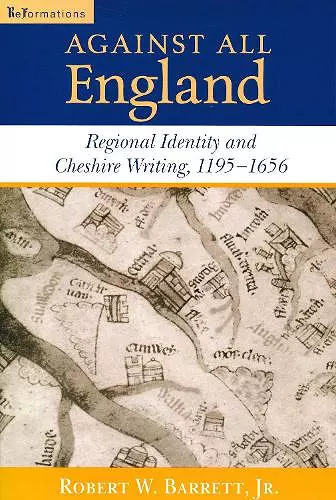Against All England
Regional Identity and Cheshire Writing, 1195-1656
Format:Paperback
Publisher:University of Notre Dame Press
Published:15th Jan '09
Currently unavailable, and unfortunately no date known when it will be back

Against All England examines a diverse set of poems, plays, and chronicles produced in Cheshire and its vicinity from the 1190s to the 1650s that collectively argue for the localization of British literary history. These works, including very early monastic writing emanating from St. Werburgh’s Abbey, the Chester Whitsun plays, Sir Gawain and the Green Knight, seventeenth-century ceremonials, and various Stanley romances, share in the creation and revision of England’s cultural tradition, demonstrating a vested interest in the intersection of landscape, language, and politics. Barrett’s book grounds itself in Cestrian evidence in order to offer scholars a new, dynamic model of cultural topography, one that acknowledges the complex interlacing of regional and national identities within the longue durée extending from the post-Conquest period to the Restoration. Covering nearly five centuries of literary production within a single geographical location, the book challenges still dominant chronologies of literary history that emphasize cultural rupture and view the “Renaissance” as a sharp break from England’s medieval past.
“This is a provocative and engaging study, which challenges previously held critical views of Cheshire and its literature. . . . Barrett’s monograph is path breaking and proposes fertile avenues for further research.” —Studies in the Age of Chaucer
“Barrett succinctly and precisely situates his primary materials in terms of the local, regional, national, and even international issues they engage. Moreover, the book is noteworthy for Barrett’s graceful assertion of his claims while sustaining a generous stance toward other critics. The quality of the edition also merits mention. During a time when so many presses employ minuscule fonts to cut costs, Notre Dame has published a reader-friendly book.” —Modern Philology
“This is an ambitious scholarly book that will reward its readers not just because it provides a complex and subtle discussion of Cestrian writing but also because it is an engaging model for a nimble, spatially oriented literary history that asks us to reconsider every paradigm we hold dear.” —Speculum
“Robert Barrett Jr. presents a spirited challenge to persistent chronological and national/regional boundaries in England, in particular those based on London’s literary production. Throughout the book, Barrett deftly shifts between literary and historical analysis, as for him local identity ‘has a material basis in distinct institutions and practices. . . . Barrett makes the most of the sources, working in gender, architectural, and other analyses to provide a crisp, detailed picture of the region and its identities.” —Sixteenth Century Journal
“In this book, Robert W. Barrett, Jr., investigates the ways in which medieval and early modern Cheshire texts ‘work together to complicate persistent academic binaries of metropole and margin, centre and periphery, and nation and region.’ Barrett’s study demonstrates that regional identity can be shaped and asserted according to disparate agendas, showing how ‘county unit’ itself was always ‘a product of intraregional conflict and compromise’ as well as negotiation with national narratives.” —English Historical Review
“Offering a rich survey of Cheshire culture in a literary-historical analysis that transcends medieval-modern boundaries, Robert W. Barrett, Jr.’s Against All England: Regional Identity and Cheshire Writing, 1195-1656 provides a crucial intervention in recent conversations about medieval nationhood. Barrett’s Against All England powerfully presents the continuity of such regional discourse, even as his richly sourced study explores the varying medieval and early modern cultural and historical pressures negotiated by Cheshire writing.” —Journal of English and Germanic Philosophy
“Barrett’s conclusion is a tour de force which reinforces many of the arguments of the book through an examination of present day Chester ceremonial . . . this remains an important book which should be read by all those concerned with place and space, identity, urban literature and the fundamental narratives by which we understand literary history.” —Review of English Studies
“. . . a thorough historical study arguing for the importance of regional identities in dialogue with the national one. The book lives, however, not in that claim but in its many absorbing details. It is also interesting for what it adds to our knowledge of a great work of English literature outside our period, Sir Gawain and the Green Knight.” —Studies in English Literature 1500 – 1900
“Identities national or local, and their links with landscape, borders, and the like, are a fashionable topic. . . . In five chapters, Against All England hence surveys five centuries of Cheshire writing with this theme. . . . The author has worked hard, providing maps of Cheshire and Chester, and even photographs of Chester now, with the chapel of St Nicholas. . .” —Modern Language Review
“A study of plays, poems and chronicles produced in Cheshire that document a regional literary identity.” —The Chronicle Review
ISBN: 9780268022099
Dimensions: 229mm x 152mm x 17mm
Weight: 432g
326 pages